- Home
- J. P. Donleavy
J.P. Donleavy
J.P. Donleavy Read online
Contents
Title Page
Introduction Why Do I Write
PART 1 The Writer and His Art
An Author and His Image
Tools and Traumas of the Writing Trade
An Essay in Contemplation of Writing the Second Volume of The History of the Ginger Man
Shaun Beary – A Portrait of the Playwright as a Man
PART 2 People and Places
My Own Romantic Bronx
An Expatriate View of America
Rat Holes and Magic Places
To London from Mullingar
Come to Cong Where the Glamour is Still Glowing
PART 3 What a Sport
Georgian Cricket or Whither Goes Those Wickets
Sexual Exercises for Women
Whither Goeth Those Racquets and Riches at Wimbledon
Dublin Horse Show
Donleavy is Better Than McEnroe
The Manly Art of Knocking Senseless
PART 4 Life, Death and Affairs of the Heart
Whither Goeth That Bullet
Sentimental Journey – My Favourite Hotel
My First Love
Pasha of Heartbreak House
Love Letters Straight to the Heart
PART 5 Gone But Not Forgotten
W. B. Yeats Commemoration
Christmas Recollections – for Better or Worse
Remembrance of a Pain Past
The Funeral of Denny Cordell
The Funeral of the General
PART 6 Castles and Mansions, Conduct and Etiquette
An Open Letter to Those of the Nobility Befuddled by Clutter
Ghosts and Dolls in Donegal
Upon Conduct Becoming and Unbecoming a Philanderer
Nothing Looks Better Than a Harris Tweed Jacket and Faded Blue Jeans on a Sunday
PART 7 Dear Old Dublin
Trinity Quatercentenary
The Dublin Ghosts Remembered on Bloomsday
Night Out in Dublin
The Bloom of a City
The De Alfonce Bank
PART 8 Introductions and Reviews on Other Authors
Review of Selina Hastings’s Biography of Evelyn Waugh
Introduction to John Ryan’s Remembering How We Stood
Review of John de St Jorre’s The Good Ship Venus
A Voyage to the Swiftian City – an Introduction to Gulliver’s Travels
A Bit More Blarney about the Emerald Isle
PART 9 Ireland, Then and Now
The Water of Life
The Second Revolution – the Modern Enthral of the New Ireland
A Book of Irish Quotations
The Boy is Back in Town
Pasha of Heartbreak House Seeks Companion
By the Same Author
Copyright
Introduction
Why Do I Write
I don’t imagine my reasons for writing could differ greatly from those of any other author. But since I have been writing now for about forty five years, the answer to the question ‘Why do I write’ seems difficult to dig out of a long past.
Having been a painter before becoming an author taught me that the written word travelled further and reached deeper and into more minds than a painting, and was also something, once published, no amount of tearing up or a boot through a canvas could destroy or stop. Also there is the satisfaction that the written word could willy nilly penetrate and annoy people in the privacy of their own homes. And the greater justice could be done as their immediate resentments might anger them enough to put dents in their more valuable pieces of antique furniture. Or words instead touch their sensibilities so that they know they listen to a kindred soul.
But I’m sure the basic reason why one writes must originate and still lurk in one’s vanity. Which, as a testament to one’s existence, might flower in the bliss of fame and fortune. The reason also can be found in wanting to shake one’s tiny fist against a monstrous and indifferent world and speak words about that world one felt should be spoken and that no one else dared speak, especially to a world cautioning with punishment that such words should not be spoken. But as much as the conscious reason to write, the unconscious reasons must be equally as strong, and one such reason must be the mating instinct. To let kindred spirits in the world know as soon as possible that one had a beautiful if occasionally obscene mind. And to make known, if not flaunt, the uniqueness of one’s identity. Which, too, comes contradictorily out of the awareness of one’s own insignificance.
If the reasons above are why I began to write, that asks, too, another question. Why does one continue to write. And here is, if not a profound, at least an eminently sensible answer. I’m sure that at no time in my life has it ever been lost upon me that scribbling down whatever came into one’s day dreaming mind and later constructing and embellishing it, and then selling it, and turning one’s worst moments into money, is a damn nice way to make a living. Of course, too, one way or another, you live what you write. Suffering the same pain, embarrassment, sorrow and joy. Even being involved in the same mystery and love that speaks on your pages. And in the reflected romantic glory of that world of written life, you endure better your own lived life. And you not only preserve the past, but help defy death in the present.
During those forty five years there has always been a particular pleasure in publishing these short pieces and sketches in various newspapers and periodicals worldwide knowing that they would reach a public who were not normally book readers and for a moment or two one would penetrate vicariously into their lives. But as they say, periodicals and newspapers wrap fish, keep vagrants warm and help light fires. However, one keeps faith that books preserve their pages better between covers and these pieces separately written over these past twenty one years can now keep each other company.
J. P. Donleavy
Mullingar, 1996
PART 1
The Writer and His Art
An Author and His Image
An author is always unconsciously fighting for an image and when he gets one, consciously fighting against it. But an image is often the most important endowment he can have. And a novelist usually has made his long before someone meets him. By his picture on a book jacket, or in a newspaper, for drunkenly socking a headwaiter on the jaw, or just by rumours that he is recently being released from the institution.
But most times folk see him as the autobiographical hero of what he’s written. When you find yourself faced, as I might be, by avid readers of A Singular Man, thinking that I am reclusive, rich, lonely and sad but with a private part two feet long. Or by readers of The Onion Eaters, wondering if I’m in my damp Irish castle, overwhelmed by uninvited guests, plaster and other matters falling from the ceiling, rats nibbling at my shoelaces, as I sit in front of a turf fire bemused by my three testicles. And when you’re the author of The Ginger Man and folk had warning I was coming, especially to their house, the furniture would be secretly screwed down, the drink locked up, and the key hidden to one’s host’s wife’s chastity belt.
However, the author starts out with no image at all except his burning sincerity, determination and dedication, and perhaps an occasional fist shook in a scorning relative’s face that by God he’s going to be rich and famous. A legend in his lifetime. The author of a paragraph that school children have to memorize or not get into college. His female readers tucked up in corners of the world on lonely beds, reliving the words of that writer reclusively somewhere who has such a beautiful or such an extremely dirty mind. To whom such sad and obscene things must have happened. And that they, had they known him, those years ago, would have realized, that as he scooped up his fudge sundae at the local candy store, that even the way he held his spoon reeked with destiny.
So an author
really begins with an image of himself. As a lonely ignored hero to a private public he carries around in his mind. Who clap, cheer and encourage. To get him through the unknown years. And speak an unspoken answer to all the voices saying, who do you think you are. Proust or something. He thinks he is Balzac. Because he owes for last month’s rent and yesterday’s hashish. His close friends plant careful seeds of despair in his open hearted yearning for recognition. By someone. Preferably sitting on an editorial throne of judgement, surrounded by unabridged dictionaries. But instead this someone happens to be the best known literary gossip writer on the biggest serious newspaper. Who, as he dismisses one more pompous best selling novelist just flown into town, ends his column saying he has just read a manuscript of promise delivered by hand to his club. A young man obviously writing under duress, just north of 233rd Street in the Bronx, and especially deserving of a Foundation grant. And on this dream the author hibernates.
Till the unbelievable one day he wakes up for good when he is finally published. The book does not soar into the stratosphere. That’s the place where people think you sit overlooking the Plaza Fountain taking noonday breakfast with the waiter plugging in the phone to take your calls from the Coast with your Louis Roederer and scrambled eggs. But alas for this author a major silence of five years descends. Of distant minor little voices saying to one another, hey you ought to read this book.
And one day you meet one of these voices. Which says are you really him, just standing here in your moccasins in the supermarket on Columbus Avenue and West 70th Street, with two cans of frozen orange juice, powdered coffee, salami and jar of stuffed olives. I mean gee isn’t everyone dying to know you. Aren’t you crowded out of your mind with tour dates and seminars. I mean holy cow don’t you know who you are.
With this previous incident you rush one hundred and ten yards home to sit and think. Squeaking in the wicker chair in your begrimed bay window. Three solid hours next to an unringing phone. My God I was recognized. Someone knew me. And I saw her ashen faced tell her husband as I left. And they watched me carrying the specially reduced bargains. They’re going to think I haven’t got a pot to piss in. That my book which didn’t sell, didn’t sell. And now the people who didn’t buy it will never buy it. The writer blundering into his first taste of fame. And at a loss as to what props to carry or what demeanour to wear.
But the one he unconsciously or consciously tries to wear is the one which sells books. And it’s not easy to know which image does that. But the experimental struggle to find out is immense. If it calls for mounting a horse top hatted and pink coated and chasing a fox across New Jersey most authors would risk their necks, followed closely by their tweed suited publishers commandeering an ambulance, photographers in attendance. But what the author really wants is not to be out there, face flushed, hustling in the market place. But to be seen quietly, just recognizable by candlelight, solemnly dining with an adoring stunning woman, with the word whispered through the swank hotel’s lobby, he’s in there, boy just look at those white chamois gloves he wears to eat his lobster.
But in the hurrying world no image lasts for long. And the practice of private elegance becomes little comforting with book emporiums returning books to the publisher. The author in his economic rejection sets out to commune with nature. Next publishing season he will sell his deep sincerity acquired contemplating in an uninhabited mountain range in Utah. He’s only bitten once by a rattlesnake, poisoned twice by ivy and chased three times by a grizzly bear. And eighteen months and one wife later we see him on his next book jacket. Standing in front of his isolated mountainside cabin. Built with local logs with his own two bare hands. Smoke curling from the chimney. His most recent wife a Bryn Mawr graduate holding her homemade jar of wild blackberry jam in the doorway. Both grinning with the outdoor purity of it all.
Her name is Martha. She summers at the Vineyard. Her father is an investment banker. She was born and bred in Boston. And she’s the initial M in the most recent novel’s dedication. To M, who stood by. She hunts to hounds. Her bowler hatted image sweeps the fashion magazines. As she momentarily lies prostrate on the literary altar of sacrifice. And deeply interested and profoundly influenced by the Far East. There are photographs to prove it. Of her newly shaved head and the saffron nightdress she wears for evening cocktails. Until just recently. She tried on a pair of horns. When she discovered the Hopi Indians.
Not much of the author’s image is seen these days. But his wife is frequently quoted in her interviews about the god damn trouble she’s having with her husband’s meddling in her first novel. At which she works feverishly while, she complains, he spends his days, feet propped up on their tropical fish tank, the television blaring with a six pack of beer by his chair reading movie magazines while proclaiming his admiration for ditch digging Austrian women. Because at long last the neighbourhood loners and the smart kids in the colleges are beginning to read his books and the royalties are trickling in.
The fan letters come. Some of adulation. Others disconcerted because not one of their friends has ever heard of you. One offers you the rights to his life story. Enclosing a photograph but wants it understood that it is not a homosexual proposition. Profits split fifty fifty because the balance between comedy and tragedy in your work is so achingly true to life. The author takes comfort that he has sprinkled a little magic in these distant lives. That makes their voices speak back. And know that your own voice has been heard. Even by a young woman who’s read everything you’ve written. She sees in you a sad dispossessed heart like her own. Ready to take gymnastic advantage of her measurements, 37–27–37. She presently resides in an elegant mental institution, listening to Brahms as she writes. She thinks you are a bit of a phoney but someday she’d like to meet you, drink champagne and read Pushkin together.
By now the author’s first book is acclaimed. His second reprinted. His third adapted for the stage and produced on Broadway. And to keep the pot simmering his image is overhauled. He was now the most famous non selling, unknown best selling underground author in the world. Little legends begin appearing on the copyright page. Seventh printing. Ninth printing. Literary gossips whisper, hoping it isn’t true, hey this guy must be getting rich. The critics are waiting. For his fourth book. To pan this affluent author who served no public penance for his growing sales and fame. Who now had a secretary waiting, legs crossed, pencil poised in case he wanted to sue someone. His second law suit will soon be going to court. Someone’s named a restaurant after one of his books. His horse kicked an anti blood sport enthusiast. And the legal bills flood in.
Somehow the author blames the reflection of his heartfelt words that lie wounded on the page. Which make him look like a pushover. Publishers say look at all that serious adoration he’s getting, what the hell does he need to reserve all his subsidiary rights for, too. Anyway our warranty clause will make him pay for all our costs in that last legal action. On the next book jacket the writer insists to be seen scowling. His two eyes staring out from the page say I’ll get you yet, you son of a bitch. He also wanted to be photographed with a sub machine gun across his knees so his former wife Martha and her lawyers would get the message. That nobody is going to take half his royalties plus his Mercedes shooting brake, Connecticut country house and sixteen Arab horses.
But members of his own profession. They see him on easy street. Able to buy first class plane tickets and champagne for the dazzling girl that sits next to him on the way to Mexico. To whom he’s thought to gallantly say, my car’s meeting me at the airport can I give you a lift. And in case you want to see my private island my yacht is getting up steam to sail.
But there is another contingent who have a different picture of you. And they don’t like your image one damn bit. They live in nice little white houses. With nice little watered green lawns. With wives who comb their hair back straight and wear earrings on Saturday nights when other wives just like them with two children, four and six, come to dinner. Their husbands have cosy d
ens with pipe racks and paperbacks where they dissect you. And while keeping your name off the bulletin boards, make sure you get the dismissed reputation they think you deserve. These are the academics. They are sure you cannot do without them. Because they are certain you want desperately to hear that word masterpiece. And they might just, if only you’d answer their letters, be on the verge of saying it. But for the time being they must reserve judgement because they understand you can’t spell and do not know who wrote The Decameron.
So the author’s image as it glows, or glowers, waxes briefly and wanes again. A strange star in a familiar solar system. Until people sidle up at the cocktail party, look him carefully up and mostly down. Desperately wanting to remind you. That all you are is just a human being. But what are you working on now. The question means don’t think you can afford to rest your laurels on those other old hat books you wrote. The author affects a departing stance, that he’s just a micro second in town from his East Hampton summer house. Their eyes narrow, they pluck the stuffed olive off the toothpick and chew while their eyes mist over with a genuine concern for your career. Which always means do you think you’ve shot your bolt. Which in turn means does the author think he is still capable of sexual intercourse.
Suddenly the time’s come yet again for the author to present yet another image. Of his bulging bicep when he’s been shaking hands with prize fighters. Or even demonstrating how fast and hard he can hit with a right hook. He comes mornings in the altogether skipping rope out of his bedroom. The new wife Helga from the Cincinnati proletariat and a graduate of Ohio State, keeps the shades down so the neighbours won’t see what a nut she thinks he’s making out of himself. But he’s telling the world that if someone gets hit in one of his books, the punch might have come delivered from the still powerful muscles of the author. Who has plenty of uppercuts and right hooks left. And even at the advanced age of forty six can go two consecutive rounds in the ring. With any other two fisted writer you care to mention.

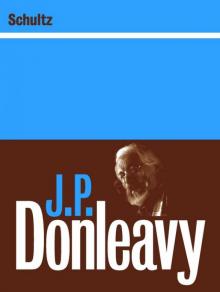 Schultz
Schultz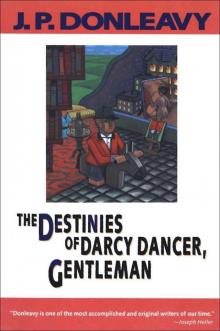 The Destinies of Darcy Dancer, Gentleman
The Destinies of Darcy Dancer, Gentleman The Lady Who Liked Clean Restrooms
The Lady Who Liked Clean Restrooms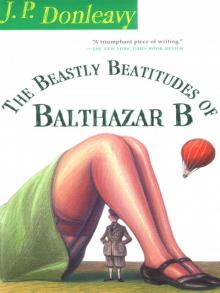 The Beastly Beatitudes of Balthazar B
The Beastly Beatitudes of Balthazar B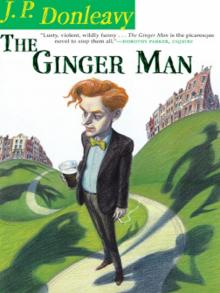 The Ginger Man
The Ginger Man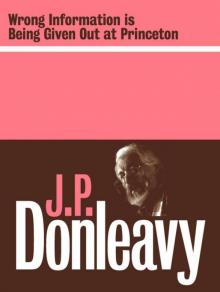 Wrong Information Is Being Given Out at Princeton
Wrong Information Is Being Given Out at Princeton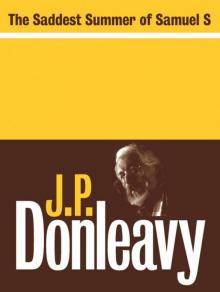 The Saddest Summer of Samuel S
The Saddest Summer of Samuel S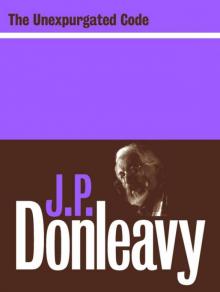 The Unexpurgated Code
The Unexpurgated Code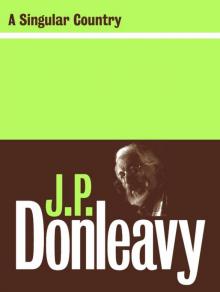 A Singular Country
A Singular Country A Singular Man
A Singular Man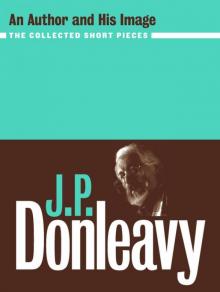 J.P. Donleavy: An Author and His Image
J.P. Donleavy: An Author and His Image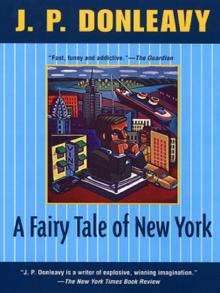 A Fairy Tale of New York
A Fairy Tale of New York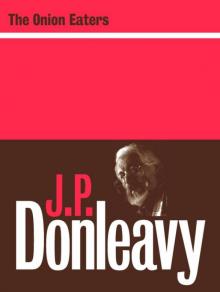 The Onion Eaters
The Onion Eaters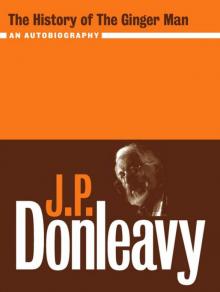 The History of the Ginger Man: An Autobiography
The History of the Ginger Man: An Autobiography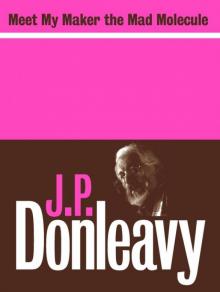 Meet My Maker the Mad Molecule
Meet My Maker the Mad Molecule Leila
Leila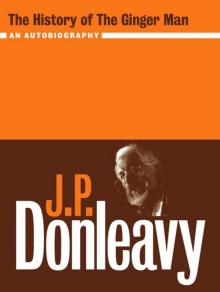 The History of the Ginger Man
The History of the Ginger Man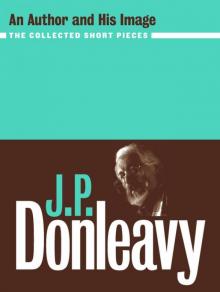 J.P. Donleavy
J.P. Donleavy